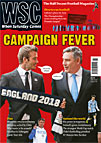 Tony Mowbray promised attacking football but lasted only nine months at Celtic Park. Neil Forsyth looks at what went wrong
Tony Mowbray promised attacking football but lasted only nine months at Celtic Park. Neil Forsyth looks at what went wrong
The car park outside Celtic Park is an influential stretch of concrete. Prominent new arrivals, such as Robbie Keane, are sent out there to receive adoration, while protests in the car park have been synonymous with much of Celtic’s recent history. They brought down the board in 1994, before Fergus McCann arrived to build a new Parkhead and start the process of correcting the club’s finances.